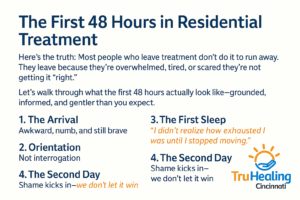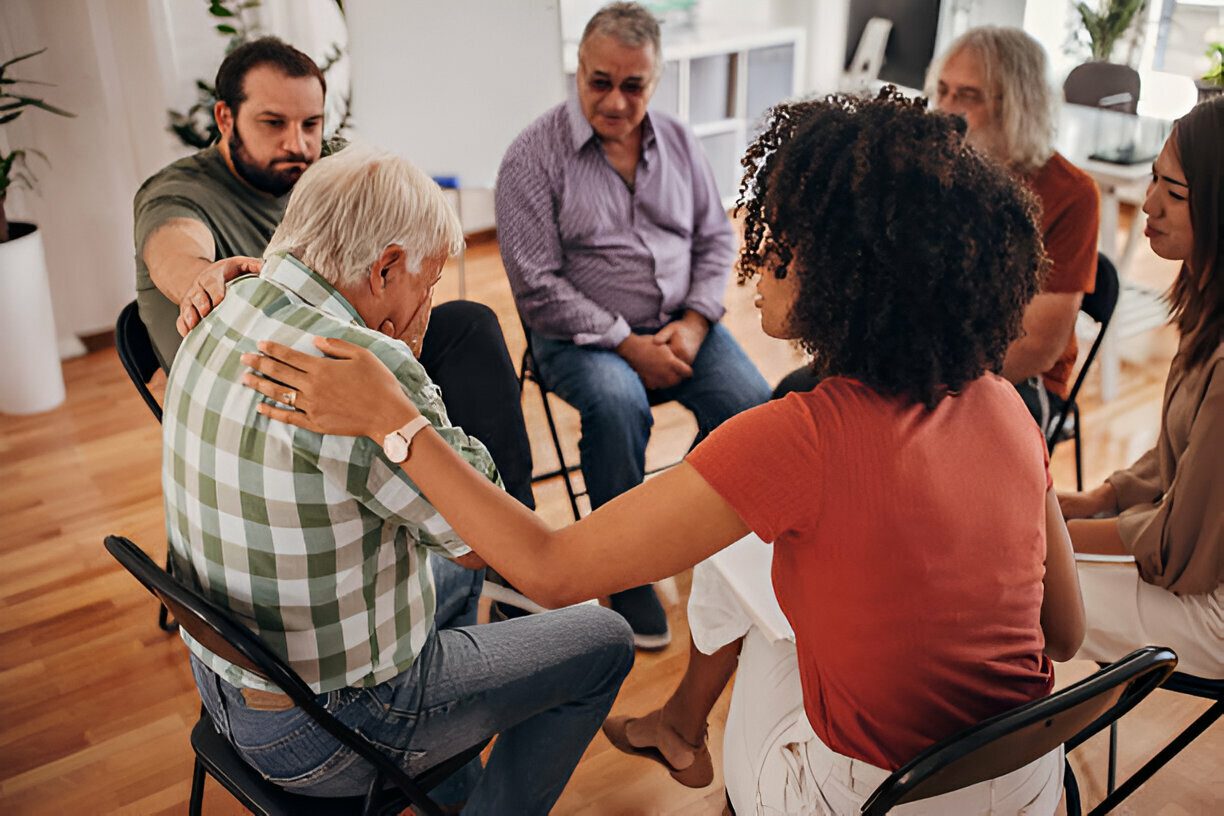You didn’t mean to ghost. Maybe you told yourself you’d take a day or two off. That you’d come back after you caught up on sleep, made that call, or just breathed for a second.
But then shame set in. Time passed. And showing up again started to feel impossible.
Here’s the truth: most people who leave treatment don’t do it to run away. They leave because they’re overwhelmed, tired, or scared they’re not getting it “right.”
If that’s you—and you’re considering returning to a residential treatment program—this blog is for you.
At TruHealing Cincinnati, we don’t ask, “Why’d you leave?” We ask, “What would help you stay this time?”
Let’s walk through what the first 48 hours actually look like—so that if you come back, it’s not blind. It’s grounded, informed, and gentler than you expect.
1. The Arrival: Awkward, Numb, and (Still) Brave
Most people don’t arrive with confidence. They walk through the door unsure whether they belong. Some are still detoxing. Some are wired from days of chaos. Some are staring at the floor, trying not to cry.
That’s not failure. That’s how arrival looks for many.
You’ll be greeted by a staff member who gets it. We’ll help you get settled, gather your things, and talk through your immediate needs. If you’ve been here before, we won’t pretend it’s your first time. We’ll just meet you where you’re at.
You don’t have to explain yourself. You don’t have to justify why now. We’re just glad you made it through the door.
2. Orientation, Not Interrogation
Within your first few hours, you’ll meet a nurse and a counselor. They’ll ask you questions about your health, substance use, medications, sleep, and more.
It’s not about catching you in a lie. It’s about helping your body and mind land without crashing.
If you’ve relapsed or dropped out before, we won’t shame you. We’ll ask about what felt hard last time—and how we can support you differently now.
Whether you’re coming from nearby Lexington, Springfield, or down the street in Cincinnati, our team helps make this part feel less like a system, and more like a landing pad.
3. The First Sleep: What Most People Don’t Expect
People often imagine the first night in treatment will be restless—too much noise, too much emotion, too many strangers.
But here’s what we hear the most:
“I didn’t realize how exhausted I was until I stopped moving.”
You may sleep for 12, 14, or even 16 hours. Some clients don’t even unpack until the next morning. And that’s okay.
Sleep isn’t a luxury here. It’s part of recovery. Your nervous system has been running on overdrive for weeks—sometimes months. In the first 48 hours, we expect you to crash. And we make room for it.

4. The Second Day: Shame Kicks In—We Don’t Let It Win
The second morning can feel heavier than the first. You’re no longer distracted by logistics or paperwork. You’ve eaten. You’ve slept. Now your mind gets loud.
“What if I’m wasting everyone’s time?”
“They probably think I’m hopeless.”
“Why am I back again?”
We name that shame before it isolates you.
You’ll likely check in with your counselor, who’s already familiar with this spiral. You’ll start group slowly—maybe not speaking at first. You’ll be reminded, again and again, that you’re not the only one who needed more than one try.
In fact, many of our most committed alumni? They left their first program. Or their second.
5. Group Therapy Isn’t a Performance
If you’ve done treatment before, you might assume group will be performative. That you’ll have to rehash your whole story, or “share” on command.
But group isn’t about pleasing anyone. It’s a place to practice being human again. To sit in a room where the goal isn’t to impress or avoid—it’s to stay present.
You can speak. Or not. Cry. Or not. Listen. Or nap, if that’s what your brain needs that day.
We ease you in.
6. What the Schedule Actually Looks Like
Structure helps regulate emotions. It’s not about discipline—it’s about stability. So while your day will have predictable parts, there’s room to breathe too.
Here’s a sample schedule:
| Time | Activity |
|---|---|
| 7:30 AM | Wake up + hygiene |
| 8:00 AM | Breakfast + medication |
| 9:00 AM | Group therapy or clinical education |
| 11:00 AM | Individual therapy or peer connection |
| 12:30 PM | Lunch |
| 2:00 PM | Movement or creative activity |
| 4:00 PM | Coping skills or relapse prevention |
| 6:00 PM | Dinner |
| 7:30 PM | Wind-down group or free time |
Your second day might be lighter. Your third will feel more familiar. By the end of the week, you’ll know what’s next without checking the clock.
7. Hope Arrives Quietly
For most people, hope doesn’t show up in a big breakthrough. It arrives in micro-moments:
- Taking a full breath for the first time in days
- Laughing without bracing
- Writing something honest in a journal
- Realizing you’re not the only one who left and came back
One client told us:
“Hope wasn’t a lightbulb. It was just the first morning I didn’t dread opening my eyes.”
That’s what we aim for.
FAQs: The First 48 Hours in Residential Treatment
Do I have to explain why I left last time?
No. We’ll ask about your previous experience only to support you better—not to dissect it. You don’t need to justify your return.
Can I come back even if I was discharged or left AMA?
Yes. We believe in second, third, and fourth chances. Each return is honored. Each stay can help.
What if I’m using again?
We’ll help assess whether you need medical detox before entering residential care. Our admissions team handles this with compassion, not judgment.
Will I be thrown into groups right away?
No. We ease you in. The first day is about stabilization. Group starts gradually and at your pace.
What if I don’t feel ready by day two?
That’s okay. The first 48 hours are about landing, not performing. You’ll have time to settle before diving deeper.
You’re Allowed to Return Without Explaining Yourself
Some people walk into treatment once and stay. Most don’t.
If you’ve left, paused, ghosted, or relapsed—it doesn’t mean you can’t return. It means you’ve felt the edge. And now, you’re choosing to come back to solid ground.
We built our program at TruHealing Cincinnati for real people—not perfect ones. The first 48 hours aren’t easy, but they are possible. And the second time around? You might find it lands deeper.
Call (888) 643-9118 or visit our residential treatment program in Cincinnati, Ohio to take that step—quietly, bravely, and without apology.

